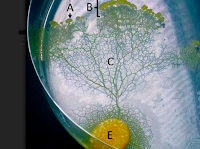Get links to comprehension texts, stepped Common Entrance and GCSE-style exercises from the best of the internet right now. This range of exercises covers all ages and abilities, with difficult vocabulary explained. Click on the picture or title to go to the article.
Genre: fiction, children’s stories
Wordcount: 1,200 words (approx)
Topic: (1) boys at school (2) drought in Trinidad (3) country childhood (4) scientist studying monkeys
Reading difficulty: 2-3
Article ONE
 Oranges aren’t orange. Oranges weren’t named for their color – because their color often wasn’t orange. Find out how they get their brilliant hue, why many ripe oranges have to be dyed, and why nothing in the world is what you think it is… [read more]
Oranges aren’t orange. Oranges weren’t named for their color – because their color often wasn’t orange. Find out how they get their brilliant hue, why many ripe oranges have to be dyed, and why nothing in the world is what you think it is… [read more]Genre: Non-fiction, blog post
Wordcount: 381
Topic: biology, fruit, food, comedy
Reading difficulty: 3
Difficult Vocabulary
chlorophyll = is a green pigment in plants that lets them absorb energy from light
hue = colour, shade of colour
Common Entrance (Age 11+ and 13+) Style Questions
1. What is the fruit ‘orange’ named after?
2. Explain in detail, in your own words, why oranges are sometimes green?
3. How are green oranges turned orange? Explain in detail, in your own words.
GCSE (age 16) style Questions
1. What do you learn from the article? Sum it up in your own words, in detail.
Article TWO
Why Slime Moulds Can Solve Mazes Better than Robots Despite not having brains, slime moulds are able to remember where they’ve been. They avoid oozing back over paths that didn’t lead them to food by detecting “memories” in the trails of slime they … [read more]
Genre: Non-fiction, blog post
Genre: Non-fiction, blog post
Wordcount: 500
Topic: biology, science
Reading difficulty: 5
Difficult Vocabulary
recollections noun, pl.= memories
evolution noun= development of a species by natural selection
cognitive adj. = to do with thinking, knowing, remembering
species noun = type
cellular adj = related to cells
tendrils noun, pl= twisting, thread-like structure
stimuli noun, pl.= events in the environment that influence behaviour
mimic vb = copy, pretend to be
eliminate vb = completely get rid of
prior = earlier
detect vb= discover or identify
quantify vb. = give a precise number-value
neural adj= relating to nerves, or the nervous system
sentience noun (sentient, adj) = self-awareness / consciousness
Stepped Questions
1 How do slime moulds remember where they have been? [paragraph 1]
2 How does slime mould move? [paragraph 2]
3 Slime mould doesn’t move around completely at random. In what way does it move? [paragraph 3]
4. What happened in the experiment when scientists coated the maze with slime? [paragraph 4]
5. What is a slime trail and what does it do? [paragraph 5]
GCSE (age 16) style Questions
What do you learn from the article? Sum it up in your own words, in detail.
Reading Difficulty Key
1 Average reading age 9 year olds; less able 11 year olds
2 Average grade 11 year olds
3 A grade 11 year olds up to C-grade 16 year olds
4 A grade 13 year olds to B-grade 16 year olds
5 A* grade 16 year olds
2 Average grade 11 year olds
3 A grade 11 year olds up to C-grade 16 year olds
4 A grade 13 year olds to B-grade 16 year olds
5 A* grade 16 year olds

